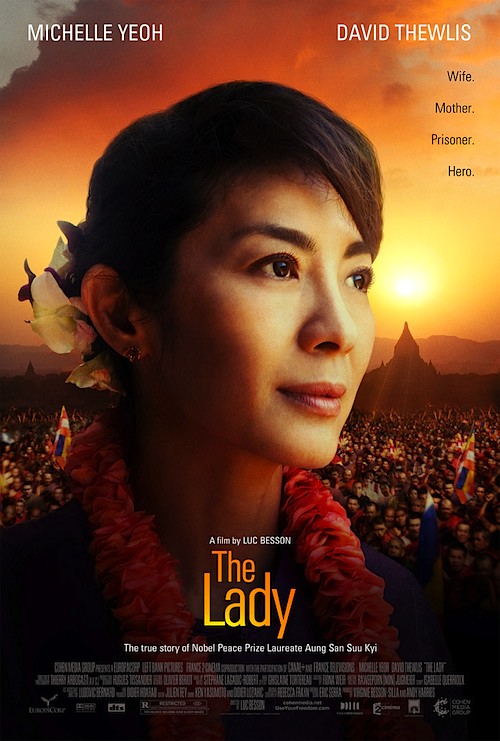By Joe Bendel. Nobel Peace Laureate Aung San Suu Kyi’s recent parliamentary election sounds like a breakthrough for a free and democratic Burma. However, it is important to remember past promises of liberalization have evaporated into fresh repression time and time again. Suu Kyi has witnessed those periodic crackdowns from a distinctly personal vantage point, becoming the international face of the Burmese opposition, at tremendous personal cost. Her courageous activism and sacrifices are stirringly dramatized in Luc Besson’s The Lady, which opens tomorrow in New York.
Suu Kyi’s father, General Aung San, was the hero of Burma’s drive for independence. A committed nationalist, he was assassinated by allies-turned-rivals when Suu Kyi was just a child. As the daughter of the revered General, Suu Kyi would be seen as a natural leader for the developing Burmese democracy movement.
In the late 1970’s and early 1980’s, Suu Kyi lived a quiet but pleasant life as an Oxford academic with her husband, Dr. Michael Aris, a specialist in Himalayan culture. Returning to comfort her ailing mother, Suu Kyi agreed to lend her prestige to the opposition on the eve of the 8.8.88 uprising. It began a period of activism defined by her fifteen non-consecutive years spent under solitary house arrest.
 The Lady directly conveys the lonely reality of her imprisonment, as well as the heartbreaking tragedy. Denying her husband and sons entry visas, the military government forced Suu Kyi to choose between her family and her country. As a result, she would never have the chance to tend to Dr. Aris during his fatal bout with cancer.
The Lady directly conveys the lonely reality of her imprisonment, as well as the heartbreaking tragedy. Denying her husband and sons entry visas, the military government forced Suu Kyi to choose between her family and her country. As a result, she would never have the chance to tend to Dr. Aris during his fatal bout with cancer.
Though obviously partly intended as an advocacy film on behalf of Suu Kyi’s democratic coalition, The Lady is most effective as a thinking person’s romance. It is clear Aris and Suu Kyi’s relationship was one of the world’s great love stories. Indeed, it was a perceived weakness the military regime unsuccessfully sought to exploit.
Former Miss Malaysia and legendary HK action star Michelle Yeoh delivers a career performance as Suu Kyi. Still one of the greatest movie-star beauties of all time, she radiates warmth and dignity throughout the film. Yet she is not engaging in an overrated, Meryl Streep-like screen caricature (that Streep took home the Oscar while Yeoh was not even nominated was an injustice of cosmic proportions). This is a passionate, flesh-and-blood woman, who suffers acutely in the absence of her beloved husband and sons.
Likewise, David Thewliss transforms himself into the earnest Tibetologist, developing some achingly touching chemistry with Yeoh. Despite her vastly more elegant appearance, viewers really will believe they are a devoted couple. He is also devastatingly convincing when portraying Aris’s declining health. Benedict Wong (recognizable from the original State of Play) also provides a nice assist as Karma Phuntsho, Aris’s former student and close spiritual advisor.
Granted, The Lady is not exactly perfect. Rebecca Frayn’s screenplay only does a so-so job of establishing the political and historical context of Suu Kyi’s struggle, and Besson’s depiction of the ruling military elite occasional veers towards the cartoony. However, anyone can understand Yeoh and Thewliss’s performances and even the most jaded will find themselves getting choked-up (in spite of themselves) during the third act.
According to reports, the film has been banned by the Chinese Communist authorities, so what more fitting endorsement could one ask for? An unequivocally pro-democracy film and a truly heartfelt love story, The Lady is sincerely recommended for the on-screen work of Yeoh and for the real life work of Suu Kyi when it opens tomorrow (4/11) in New York at the AMC Loews Lincoln Square and the Regal Union Square.
LFM GRADE: B
Posted on April 10th, 2012 at 11:00am.
A “real” transcendent figure.